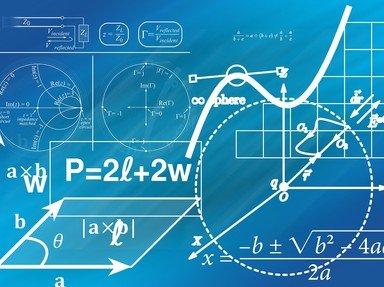Quiz Answer Key and Fun Facts
1. I'll begin with the following formula, which is for the sum of the first n positive integers:
1 + 2 + 3 + ... + n = n(n + 1)/2
Using this formula, find the following sum:
1 + 2 + 3 + ... + 74
2. Once again, we'll be using the formula for the sum of the first n positive integers:
1 + 2 + 3 + ... + n = n(n + 1)/2
This time, I want you to find the following sum:
75 + 76 + 77 + ... + 124
As a hint, note that the sum above can be found the following way:
(1 + 2 + 3 + ... + 124) - (1 + 2 + 3 + ... + 74)
3. Here's another classic formula: The sum of the first n positive odd integers is n^2:
1 + 3 + 5 + ... + (2n - 1) = n^2
Note that the nth positive integer is 2n - 1. Use the above formula to find the following sum:
1 + 3 + 5 + ... + 77
As a hint, you will first need to find the value of n that corresponds to 77.
4. As above, the sum of the first n positive odd integers is given by n^2:
1 + 3 + 5 + ... + (2n - 1) = n^2.
Use this result to find the following sum:
37 + 39 + 41 + ... + 193
As a hint, get the answer by subtracting two quantities as in question 2.
5. Here's another formula:
1 + 4 + 7 + 10 + ... + (3n - 2) = n(3n - 1)/2
Use this one to find the following sum:
1 + 4 + 7 + 10 + ... + 1999
6. All of the above formulas were for sums of arithmetic progressions. In each of the sums above, the numbers all differed by the same amount. The remaining ones will be different. The following is the formula for the sum of the squares of the first n positive integers:
1^2 + 2^2 + 3^2 + ... + n^2 = n(n + 1)(2n + 1)/6
Use this formula to find the following sum:
1^2 + 2^2 + 3^2 + ... + 42^2
7. The following formula gives the sum of the cubes of the first n positive integers:
1^3 + 2^3 + 3^3 + ... + n^3 = (n(n + 1)/2)^2
Observe that it is the square of the sum of the first n positive integers! Use this formula to find the following sum:
1^3 + 2^3 + 3^3 + ... + 57^3
8. Here's a different type of formula:
1*2 + 2*3 + 3*4 + ... + n(n + 1) = n(n + 1)(n + 2)/3
Use this formula to find the following sum:
1*2 + 2*3 + 3*4 + ... + 83*84
9. Here's another formula similar to the last one:
1*3 + 2*4 + 3*5 + ... + n(n + 2) = n(n + 1)(2n + 7)/6
Use this formula to find the following sum:
3 + 8 + 15 + ... + 728
As a hint, you first need to find the value of n that satisfies n(n + 2) = 728.
10. The last formula is one with a nice sum, but here we are summing a sequence whose general term is a quadratic:
1 + 7 + 19 + 37 + ... + (3n^2 - 3n + 1) = n^3
Use the above formula to find the following sum:
1 + 7 + 19 + 37 + ... + 1951
As a hint, find the value of n first by solving a quadratic equation.
Source: Author
rodney_indy
This quiz was reviewed by FunTrivia editor
crisw before going online.
Any errors found in FunTrivia content are routinely corrected through our feedback system.
